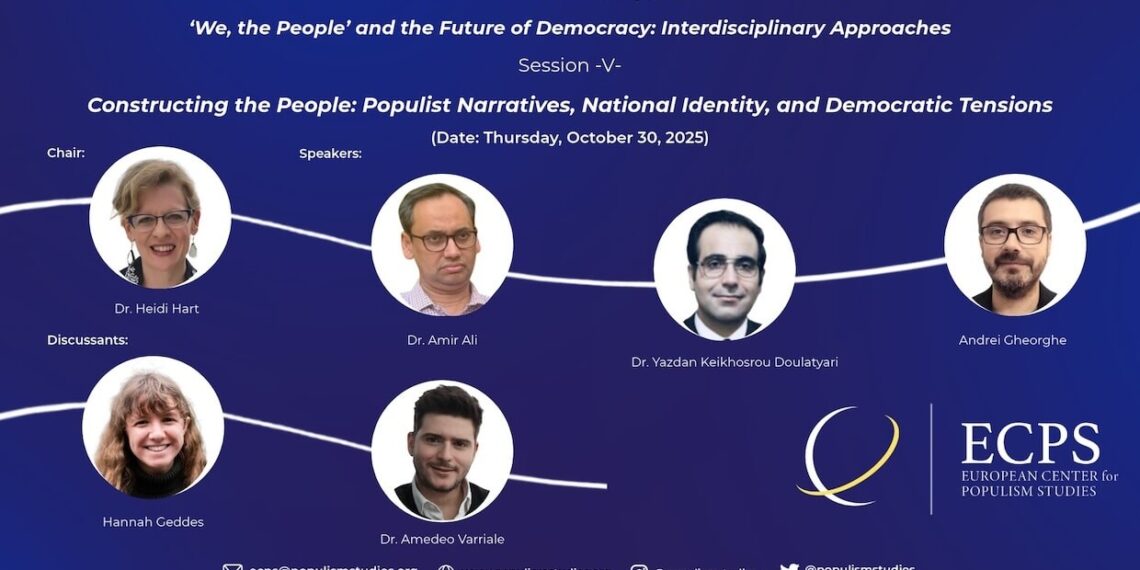Please cite as:
ECPS Staff. (2025). “Virtual Workshop Series — Session 5: Constructing the People: Populist Narratives, National Identity, and Democratic Tensions.” European Center for Populism Studies (ECPS). November 3, 2025. https://doi.org/10.55271/rp00117
Session 5 of the ECPS–Oxford Virtual Workshop Series examined how populist movements across different regions construct “the people” as both an inclusive democratic ideal and an exclusionary political weapon. Moderated by Dr. Heidi Hart, the session featured presentations by Dr. Amir Ali, Dr. Yazdan Keikhosrou Doulatyari, and Andrei Gheorghe, who analyzed populism’s intersections with austerity politics, linguistic identity, and post-communist nationalism. Their comparative insights revealed that populism redefines belonging through economic moralization, linguistic appropriation, and historical myth-making, transforming pluralist notions of democracy into performative narratives of unity and control. The ensuing discussion emphasized populism’s adaptive power to manipulate emotion, memory, and discourse across diverse democratic contexts.
Reported by ECPS Staff
On October 30, 2025, the European Center for Populism Studies (ECPS), in collaboration with Oxford University, convened Session 5 of its Virtual Workshop Series, titled “We, the People” and the Future of Democracy: Interdisciplinary Approaches. This ongoing series (September 2025–April 2026) explores the cultural, economic, and political dimensions of populism’s impact on democratic life across diverse global contexts.
Titled “Constructing the People: Populist Narratives, National Identity, and Democratic Tensions,” the fifth session brought together scholars from political science, sociology, and linguistics to interrogate how populist movements construct and mobilize “the people” as a moral, cultural, and emotional category. The discussion illuminated the multiple ways in which populist discourse reshapes collective identity, redefines sovereignty, and challenges democratic pluralism.
The session was moderated by Dr. Heidi Hart, an arts researcher and practitioner based in Utah and Scandinavia, whose expertise in cultural narratives and affective politics enriched the workshop’s interpretive lens. Three presentations followed, each approaching the notion of “the people” from a distinct analytical angle. Dr. Amir Ali (Jawaharlal Nehru University, New Delhi) examined the paradox of austerity populism, arguing that fiscal conservatism has become a populist virtue masking economic dispossession. Dr. Yazdan Keikhosrou Doulatyari (Technische Universität Dresden) turned to the linguistic life of democracy in Germany, tracing how words like Volk, Leute, and Heimat encode competing visions of community, inclusion, and exclusion in the contemporary public sphere. Andrei Gheorghe (University of Bucharest and EHESS, Paris) presented a comparative analysis of Romanian and Hungarian populisms, exploring how leaders from Viktor Orbán to Traian Băsescu construct national identity through historical memory and moral dualism.
The session also featured two discussants whose critical reflections deepened the dialogue: Hannah Geddes (PhD Candidate, University of St Andrews) offered comments that emphasized conceptual clarity, methodological coherence, and the comparative breadth of the papers. Dr. Amedeo Varriale (PhD, University of East London) provided incisive observations connecting the economic, cultural, and linguistic dimensions of populism, situating the presenters’ work within wider debates on ideology, nationalism, and discourse.
Throughout the session, Dr. Hart guided the discussion and er moderation fostered an interdisciplinary dialogue among presenters and discussants, drawing attention to the intersections of economy, discourse, and collective memory. Ultimately, Session 5 revealed that the populist construction of “the people” is not merely a rhetorical act but a performative process—one that transforms democratic ideals of equality and representation into instruments of control and exclusion.


